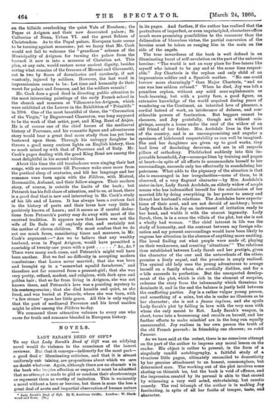NOVELS.
LADY SARAH'S DEED OF GIFT.* To say that Lady Sarah's Deed of Gift was an edifying novel would do violence to the conscience of the honest reviewer. But that it conveys—indirectly for the most part— a good deal o` illuminating criticism, and that it is almost uniformly ent, taking, are propositions about which we lave no doubt whatever. Again, although there are no chars*/ s in the book who inspire affection or respect, it must be admitted that no attempt is made to gild or condone their shortcomings or represent them as worthy of imitation. This is eminently a novel without a hero or heroine, but there is none the less a great deal of acute and impartial observation of human nature • Lady Sarah's used of Gift. By E. Aceituna Griffin. London: W. Black- wood and Sons. [Sc.] in its pages. And further, if the author has realised that the portraiture of imperfect, or even unprincipled, characters offers much more promising possibilities to the romancer than the delineation of blameless virtue, the partial conversion of the heroine must be taken as ranging him in the main on the side of the angels.
The true inwardness of the book is well defined in an illuminating burst of self-revelation on the part of the -unheroic heroine : " The world is not an easy place for free-lances like myself who intend to be gay and at the same time respect- able." Joy Charteris is the orphan and only child of an impecunious soldier and a Spanish mother. "No one could borrow more charmingly" than Major Charteris, "and no one was less seldom refused." When he died, Joy was left a penniless orphan, without any solid accomplishments or book-learning, but with a pretty face, a good figure, an extensive knowledge of the world acquired during years of wandering on the Continent, an inherited love of pleasure, a cordial hatred of work, an intolerance of dulness, and con- siderable powers of fascination. But beggars cannot be choosers, and Joy gratefully, though not without mis- givings, accepts a home under the roof of the widow of an old friend of her father. Mrs. Archdale lives in the heart of the country, and is as uncompromising and angular a specimen of hidebound respectability as can well be imagined. She and her daughters are given up to good works, they lead lives of desolating decorum, and are in all respects pillars of orthodoxy. Pitchforked suddenly into this im- peccable household, Joy—cosmopolitan by training and pagan at heart—in spite of all efforts to accommodate herself to her surroundings, succeeds only too effectually in scandalising her patroness. What adds to the piquancy of the situation is that she is encouraged in her irregularities—none of them, be it observed, of a very flagrant character —by Mrs. Archdale's sister-in-law, Lady Sarah Archdale, an elderly widow of ample means who has indemnified herself for the submission of her married life by doing everything in her power to annoy and thwart her husband's relations. The Archdales have expecta- tions of their aunt, and are not devoid of snobbery ; hence Lady Sarah finds in Joy an instrument of irritation ready to her hand, and wields it with the utmost ingenuity. Lady Sarah, then, is in a sense the villain of the plot, but she is not a wholly bad woman. " Her chief interest in life was the study of humanity, and the contrast between my foreign edu- cation and my present surroundings would have been likely to engross her attention in the absence of anything more exciting. She loved finding out what people were made of, playing on their weaknesses, and creating situations." The relations thus established between Lady Sarah and her protegie, given the character of the one and the antecedents of the other, promise a lively sequel, and the promise is amply realised.
The cynical old lady uses the young adventuress to avenge herself on a family whom she cordially dislikes, and for a w hile succeeds to perfection. But the unexpected develop- ment of the plot, which is rich in the element of surprise, redeems the story from the inhumanity which threatens to dominate it, and in the end the balance is justly held between the conflicting parties. Joy is a rather vulgar young person, and something of a minx, but she is under no illusions as to her character ; she is not a fausse ingénue, and she spoils Lady Sarah's plot by falling in love with the very man with whom she only meant to flirt. Lady Sarah's weapon, in short, turns into a boomerang and recoils on herself, and her further efforts to make mischief are in the long run equally unsuccessful. Joy realises in her own person the truth of the old French proverb : in friendship one chooses; on subit Z'amour.
As we have said at the outset, there is no conscious attempt on the part of the author to impress any moral lesson on the
reader. His object is rather to present, in the form of a singularly candid autobiography, a faithful study of a vivacious little pagan, ultimately reconciled to domesticity
by her genuine attachment to an honest, commonplace, but determined man. The working out of the plot involves some skating on thinnish ice, but the book is void of offence, and the impression created by its perusal is akin to that caused by witnessing a very well acted, entertaining, but caustic comedy. The real triumph of the author is in making Joy fascinating, in spite of all her faults of temper, taste, and character.










































 Previous page
Previous page